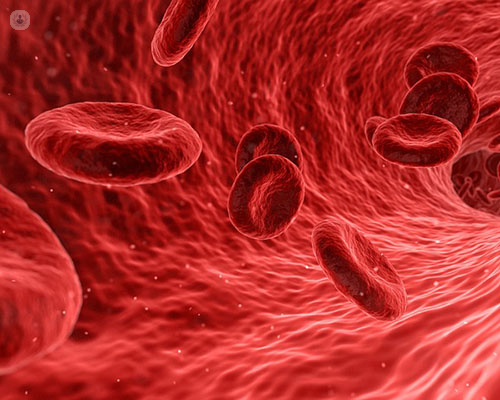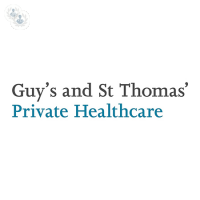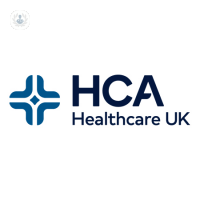What are bleeding disorders?
Coagulopathies or bleeding disorders are a group of blood coagulation disorders. They can be inherited (such as haemophilia, von Willebrand disease or hereditary platelets conditions) or acquired (caused by a defect in the synthesising process of the plasma constituents of the blood, or by an assimilation of antibodies attacking haemocoagulating factors). Acquired coagulopathies are primarily caused by an unhealthy diet, malabsorption or medications inhibiting the absorption of vitamin K (which helps with blood coagulation).
You should see a haematology specialist, who will prescribe all the necessary tests and treatments.

Prognosis of bleeding disorders:
Some bleeding disorders can cause the blood coagulation process to fail (haemorrhage or haemophilia). On the contrary, others can lead to hypercoagulation (originating thrombosis and embolisms). In both cases these disorders could become potentially life-threatening if not adequately treated.
What are the symptoms of bleeding disorders?
The most common symptoms of a bleeding disorder are:
- Bruising, for no apparent reasons;
- Haemarthrosis (bleeding into the joint spaces);
- Post-partum bleeding;
- Blood effusion in the pleura (haemothorax);
- Heavy periods (menorrhagia);
- Abnormal uterine bleeding (AUB or metrorrhagia);
- Nosebleeds;
- Anal bleeding;
- Traces of blood in the urine;
- Traces of blood in the semen;
- Thrombocytosis;
- Permanent, involuntary and painful penis erection (priapism);
- Bleeding gums;
- Rheumatism;
- Bleeding gums;
- Joint pain and swelling.
How are they diagnosed?
You will have to go through your medical history with your doctor, including your habits (which medications you’re on, if you’re allergic to anything, if you have had blood transfusions before, if you smoke and/or drink.You will also have to do a blood test (with specific testing regarding coagulation factors).
What causes bleeding disorders?
Bleeding disorders occur when there is an absence or deficiency of coagulation factors in your blood. Coagulation factors are proteins that allow the blood to clot. Their absence or deficiency can derive from several factors, including:
- Genetic factors, such as haemophilia or von Willebrand disease, or having a family history of confirmed coagulopathies;
- Acquired factors: these include taking anticoagulants, being on antibiotics for a long time, liver conditions or having disseminated intravascular coagulation (DIC).
How can bleeding disorders be prevented?
People with a high risk of developing coagulopathies should take some preventive measures, especially in case of excessively rapid clotting (which can lead to thrombosis). Exercising regularly, losing weight and avoiding sitting for too long can help you fight bleeding disorders.
How are bleeding disorders treated?
In the most severe cases, coagulopathies can be treated with blood transfusions. However, the most common treatment is medication.
Which medications can I take?
A haematology specialist may prescribe one or more of the following medications:
- Medications preventing the formation of blood clots;
- Contraceptive pill, to help with the heavy periods;
- Medications making up for the absence or deficiency in coagulation factors.
03-13-2013 09-21-2023
Bleeding disorders
Dr Nina Salooja - Haematology
Created on: 03-13-2013
Updated on: 09-21-2023
Edited by: Kate Forristal
What are bleeding disorders?
Coagulopathies or bleeding disorders are a group of blood coagulation disorders. They can be inherited (such as haemophilia, von Willebrand disease or hereditary platelets conditions) or acquired (caused by a defect in the synthesising process of the plasma constituents of the blood, or by an assimilation of antibodies attacking haemocoagulating factors). Acquired coagulopathies are primarily caused by an unhealthy diet, malabsorption or medications inhibiting the absorption of vitamin K (which helps with blood coagulation).
You should see a haematology specialist, who will prescribe all the necessary tests and treatments.

Prognosis of bleeding disorders:
Some bleeding disorders can cause the blood coagulation process to fail (haemorrhage or haemophilia). On the contrary, others can lead to hypercoagulation (originating thrombosis and embolisms). In both cases these disorders could become potentially life-threatening if not adequately treated.
What are the symptoms of bleeding disorders?
The most common symptoms of a bleeding disorder are:
- Bruising, for no apparent reasons;
- Haemarthrosis (bleeding into the joint spaces);
- Post-partum bleeding;
- Blood effusion in the pleura (haemothorax);
- Heavy periods (menorrhagia);
- Abnormal uterine bleeding (AUB or metrorrhagia);
- Nosebleeds;
- Anal bleeding;
- Traces of blood in the urine;
- Traces of blood in the semen;
- Thrombocytosis;
- Permanent, involuntary and painful penis erection (priapism);
- Bleeding gums;
- Rheumatism;
- Bleeding gums;
- Joint pain and swelling.
How are they diagnosed?
You will have to go through your medical history with your doctor, including your habits (which medications you’re on, if you’re allergic to anything, if you have had blood transfusions before, if you smoke and/or drink.You will also have to do a blood test (with specific testing regarding coagulation factors).
What causes bleeding disorders?
Bleeding disorders occur when there is an absence or deficiency of coagulation factors in your blood. Coagulation factors are proteins that allow the blood to clot. Their absence or deficiency can derive from several factors, including:
- Genetic factors, such as haemophilia or von Willebrand disease, or having a family history of confirmed coagulopathies;
- Acquired factors: these include taking anticoagulants, being on antibiotics for a long time, liver conditions or having disseminated intravascular coagulation (DIC).
How can bleeding disorders be prevented?
People with a high risk of developing coagulopathies should take some preventive measures, especially in case of excessively rapid clotting (which can lead to thrombosis). Exercising regularly, losing weight and avoiding sitting for too long can help you fight bleeding disorders.
How are bleeding disorders treated?
In the most severe cases, coagulopathies can be treated with blood transfusions. However, the most common treatment is medication.
Which medications can I take?
A haematology specialist may prescribe one or more of the following medications:
- Medications preventing the formation of blood clots;
- Contraceptive pill, to help with the heavy periods;
- Medications making up for the absence or deficiency in coagulation factors.


Irregular vaginal bleeding: should I be concerned?
By Dr Tilottama Nandy
2024-12-14
If women are experiencing irregular bleeding they may feel anxious and concerned that it is a sign of something more serious. Renowned consultant obstetrician and gynaecologist Dr Tilottama Nandy explains more about the condition, including what provokes it and when it is necessary to seek medical advice. See more


Decoding your cycle: when to worry about abnormal uterine bleeding
By Miss Iman Riad
2024-12-11
Abnormal uterine bleeding (AUB) refers to irregularities in the menstrual cycle, including bleeding between periods, excessively heavy or prolonged periods, or bleeding after menopause. This article provides an overview of common causes, such as hormonal imbalances, polycystic ovary syndrome (PCOS), fibroids, infections, and in rare cases, cancer. It outlines when women should seek medical attention and the diagnostic tools typically used, including blood tests, ultrasounds, and biopsies. Treatment options vary depending on the cause and may include hormonal therapies, surgical procedures, or lifestyle changes. Early diagnosis and regular check-ups are key to managing AUB effectively. See more


Rectal bleeding: a quick guide
By Mr Amir Ghanbari
2024-12-06
Rectal bleeding is a common condition which may cause pain and discomfort and be a source of distress for patients. However, it may not always signify something serious. Here to provide a guide to rectal bleeding is leading colorectal surgeon Mr Amir Ghanbari, who discusses the common causes of the condition, and treatment options. See more


When is uterine bleeding considered to be abnormal?
By Mr Osama Naji
2024-11-13
Have you recently noticed an excessive amount of menstrual bleeding? If so, this article might contain some key bits of information that you have been looking for. Here, Mr Osama Naji, a revered consultant gynaecologist, details what abnormal uterine bleeding is, and tells us just how effective ultrasound scanning can be with regards to its management. See more
Experts in Bleeding disorders
-
Dr Nina Salooja
HaematologyExpert in:
- Bleeding disorders
- Thrombosis
- Anaemia
- Purpura
- Haemochromatosis
- Platelet disorders
-
Dr James Uprichard
HaematologyExpert in:
- Anaemia
- Bleeding disorders
- Haemochromatosis
- Haemophilia
- Platelet disorders
- Thrombosis
-
Dr Carolyn Millar
HaematologyExpert in:
- Bleeding disorders
- Thrombosis
- Haemophilia
- Platelet disorders
- Anaemia
- Thrombocytopenia
-
Dr Riaz Jan-Mohamed
HaematologyExpert in:
- Bleeding disorders
- Stem cells
- Haemochromatosis
- Lymphoma
- Anaemia
-
Dr Sunil Gupta
HaematologyExpert in:
- Low blood count
- Deep vein thrombosis (DVT)
- Anaemia
- Myeloproliferative disorders
- Bleeding disorders
- Platelet disorders
- See all

Westminster Bridge Consulting Rooms at St Thomas' Hospital Private Healthcare.
Westminster Bridge Consulting Rooms at St Thomas' Hospital Private Healthcare.
Westminster Bridge Road, London
No existe teléfono en el centro.
By using the telephone number provided by TOP DOCTORS, you automatically agree to let us use your phone number for statistical and commercial purposes. For further information, read our Privacy Policy
Top Doctors

London Haematology
London Haematology
22 Devonshire Place, W1G 6JA
No existe teléfono en el centro.
By using the telephone number provided by TOP DOCTORS, you automatically agree to let us use your phone number for statistical and commercial purposes. For further information, read our Privacy Policy
Top Doctors

London Bridge Hospital - part of HCA Healthcare
London Bridge Hospital - part of HCA Healthcare
27 Tooley St
No existe teléfono en el centro.
By using the telephone number provided by TOP DOCTORS, you automatically agree to let us use your phone number for statistical and commercial purposes. For further information, read our Privacy Policy
Top Doctors
-
Westminster Bridge Consulting Rooms at St Thomas' Hospital Private Healthcare.
Westminster Bridge Road, London , SE1 South Bank LondonExpert in:
- General Surgery
- Orthopaedic surgery
- Plastic surgery, reconstructive and aesthetics
- Endocrinology
- Obstetrics and Gynaecology
- Paediatrics
-
London Haematology
22 Devonshire Place, W1G 6JA, W1G Marylebone LondonExpert in:
- CAR-T therapy
- Haemato-oncology
- Haematology
- Myeloproliferative disorders
- Red blood cell disorders
- Stem cell transplant
-
London Bridge Hospital - part of HCA Healthcare
27 Tooley St, Central LondonExpert in:
- 24-hour service
- Cardiology
- Minimal access surgery (keyhole surgery)
- Orthopaedic surgery
- Cardiovascular disease
- Gastroenterology
- Most viewed diseases, medical tests, and treatments
- CAR-T cells
- Hodgkin's lymphoma
- Leukaemia
- Thrombophilia
- Bowel cancer
- Liver cancer
- Chronic fatigue
- Thalassaemia
- Lymphoma
- Iron metabolism disorders







